 MyDogBreeds
MyDogBreeds Schnoodle is originated from United States but Beagle-Harrier is originated from France. Schnoodle may grow 16 cm / 7 inches higher than Beagle-Harrier. Schnoodle may weigh 20 kg / 45 pounds more than Beagle-Harrier. Schnoodle may live 3 years more than Beagle-Harrier. Both Schnoodle and Beagle-Harrier has same litter size. Both Schnoodle and Beagle-Harrier requires Moderate maintenance.
Schnoodle is originated from United States but Beagle-Harrier is originated from France. Schnoodle may grow 16 cm / 7 inches higher than Beagle-Harrier. Schnoodle may weigh 20 kg / 45 pounds more than Beagle-Harrier. Schnoodle may live 3 years more than Beagle-Harrier. Both Schnoodle and Beagle-Harrier has same litter size. Both Schnoodle and Beagle-Harrier requires Moderate maintenance.
 The Schnoodle was developed in the 1980s. It is believed the dog originates from the USA. This was when it was discovered that breeding the poodle with other dogs produced excellent mixes.
The Schnoodle was developed in the 1980s. It is believed the dog originates from the USA. This was when it was discovered that breeding the poodle with other dogs produced excellent mixes.
The idea with the Schnoodle was to develop a low-shedding dog. The Schnoodle is a mix between a Schnauzer and a Poodle,but because both the Poodle ad Schnauzer have different sizes, there is no knowing what size the Schnoodle will be.
Major kennels don’t recognize the Schnoodle as a breed.
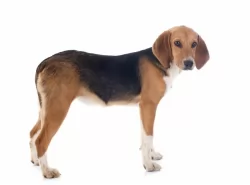 The Beagle Harrier, the breed that was made mixing the France Scent Hounds and a Beagle.
It is not quite sure if this breed was made on purpose or the mix of the breeds happened and resulted in a great dog so the breeding continued.
Since they are not large dogs as hounds, they are used to hunt small animals.
The Beagle Harrier, the breed that was made mixing the France Scent Hounds and a Beagle.
It is not quite sure if this breed was made on purpose or the mix of the breeds happened and resulted in a great dog so the breeding continued.
Since they are not large dogs as hounds, they are used to hunt small animals.
This first breeding took place in England, but after the 14th century, they were breed on purpose in France.
 The Schnoodle is a cross between a poodle and a schnauzer and with the poodle parent in the mix, the dog is considered to be hypoallergenic.
The Schnoodle is a cross between a poodle and a schnauzer and with the poodle parent in the mix, the dog is considered to be hypoallergenic.
Because there are three sizes of Schnauzer, the Schnoodle can be medium sized but also fairly large. Weight of this dog can be anything from 6 to 45 Kg and he can stand at between 38cm to 66cm. The coat can be either wavy, straight or curly and will need to be brushed, stripped or clipped according to the coat they have.
The most common coat colors are grey, a mix of grey, silver and white, a fawn or creamish color and black. The medium sized ears are floppy.
Because this is a mixed breed you won’t get a fixed personality type and you won't find fixed looks. Because the dog comes from two excellent parent breeds, you can expect your schnoodle to be friendly, alert and very active.
They may not take readily to kids so it is up to the human owners to see that their children are brought up to be kind and respectful to dogs and animals. Your Schnoodle can be gentle too and stubborn but he will bond closely with his human family.
The smallish size of these dogs makes it a good choice for city or country life, but wherever he is, he will need lots of exercise. Schnoodles are smart and respond well to training.
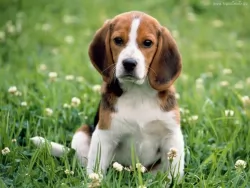 The Beagle Harrier is a scent hound that is described as a big sized Beagle or a small sized Harrier. This breed was developed from this two breeds, actually. Despite the looks of these breeds, the Beagle Harrier is an energetic kind of dog who gets very attached to his family. This medium sized pet comes in variations of colours and they are usually tricoloured. They usually have dark coloured eyes, white paws, and They usually grow up to have a very muscular body, but, if you don’t provide them with the daily activity they need, they will quickly get obese and unhappy.
The Beagle Harrier is a scent hound that is described as a big sized Beagle or a small sized Harrier. This breed was developed from this two breeds, actually. Despite the looks of these breeds, the Beagle Harrier is an energetic kind of dog who gets very attached to his family. This medium sized pet comes in variations of colours and they are usually tricoloured. They usually have dark coloured eyes, white paws, and They usually grow up to have a very muscular body, but, if you don’t provide them with the daily activity they need, they will quickly get obese and unhappy.
 Thanks to their parents, Schnauzer cross Poodles are smart, easy to train and fast learners.
Thanks to their parents, Schnauzer cross Poodles are smart, easy to train and fast learners.
Schnoodles are also fun-loving dogs, and they make great playmates for children. They are also a good choice for first time dog owners. A bonus part for dog owners is that these dogs are low shedding, making them great for anyone who suffers from allergies.
The Schnoodle forms strong bonds with their human family and this makes them both protector and watchdog. He is a great family dog with some excellent characteristics from each of the parent dog breeds involved.
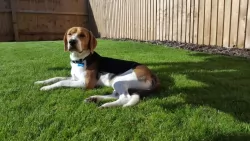 The Beagle Harrier, if trained properly and socialized while he was still a pup, will be the great playmate for any child. They get along with strangers, as well. We might say that they will get along with anybody who is ready to run and play with him. Children are most likely that kind of playdate, so it appears that they like children more. The Beagle Harrier is a great family pet, and he is great with babies, toddlers, teenagers… so don’t be afraid to leave the dog alone during the playdate!
The Beagle Harrier, if trained properly and socialized while he was still a pup, will be the great playmate for any child. They get along with strangers, as well. We might say that they will get along with anybody who is ready to run and play with him. Children are most likely that kind of playdate, so it appears that they like children more. The Beagle Harrier is a great family pet, and he is great with babies, toddlers, teenagers… so don’t be afraid to leave the dog alone during the playdate!
hunting, scent tracking, search dog
Some will say that the Beagle Harrier is one of the most desirable pets because of his loving and lively nature. They get along with almost anyone and they don’t mind living indoors if you have the time to take him out for a daily run each day. They will do great in a large group of people and any public places so you can take your Beagle Harrier with you anywhere you go.
Since the Beagle Harrier is placed in a group of the hound dogs, you must be aware that he will have the attitude of the pack leader. Once you got the Beagle Harrier puppy, you must start training and socializing him in order to grow the pet that will be easy to handle and accepted by the family and all the people around you, even strangers. They are very intelligent and they have a calm nature so they will be quite easy to train.
 The Schnoodle is a robust, healthy breed, but unfortunately he can also succumb to any one of the many dog illnesses there are -
The Schnoodle is a robust, healthy breed, but unfortunately he can also succumb to any one of the many dog illnesses there are -
This refers to an eye disease which results in the deterioration of the retina. Your dog develops night blindness and this can lead to total blindness. Unfortunately there is no cure.
It can be horrible seeing your pet jerking and twisting out of control with seizures. You will need to get your pet to the vet as epilepsy can be a symptom of a bigger issue.
This is a life threatening disease where your dog’s stomach fills with gas and becomes hard and swollen. The stomach can twist. Symptoms of bloat include restlessness, drooling and trying to vomit.
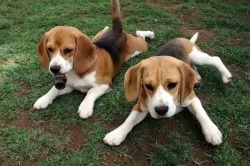 Almost every active dog suffers from joint diseases. Even though it’s generally a genetic disease, you can lower the chances of hip or elbow dysplasia by taking care of your dog’s weight, diet and daily exercise.
Almost every active dog suffers from joint diseases. Even though it’s generally a genetic disease, you can lower the chances of hip or elbow dysplasia by taking care of your dog’s weight, diet and daily exercise.
The Beagle Harrier has big ears that are always set down. That makes them ideal for the dirt accumulation, ear irritations and ear infections. Check his ears regularly and clean them at least once a week.
 The Schnoodle is a dog that will need a good dose of exercise. Provide him with daily walks, walks in the park, hikes, runs along the beach as well as ball and rope games.
The Schnoodle is a dog that will need a good dose of exercise. Provide him with daily walks, walks in the park, hikes, runs along the beach as well as ball and rope games.
Always try to feed your dog a high quality food. Many people give their dogs one of the commercially manufactured foods there are because they are wonderfully convenient, and you get some good ones.
You don’t want to give this food to your dog day after day after day. Feed him some home-made food occasionally which can be added to his dry kibble twice a week. Boiled chicken, brown rice or pasta and spinach, sweet potatoes and carrots are a healthy choice for your pet.
You can boil it, chop it all up and add smaller portions to the dry kibble twice a week as a wonderful, tasty treat for your dogs.
Try and include some raw meat into the diet as this can help to fight of skin diseases. Ensure there is always a bowl of fresh, cool water for him.
Make sure all the necessary vaccines are up to date to avoid some of the deadly canine diseases there are.
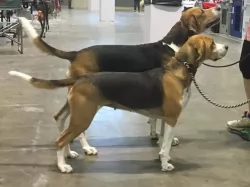 Since the Beagle Harrier is an active dog breed, they will need food for the active dogs. Make sure you provide them with quality food that will give them enough strength to get through the very active day, and not gain too much of the weight. It is very important that you don’t overfeed him because this breed quickly becomes obese. It is advisable to use treats while you train him to do new tricks, but be very careful with the amount you give to the dog.
Since the Beagle Harrier is an active dog breed, they will need food for the active dogs. Make sure you provide them with quality food that will give them enough strength to get through the very active day, and not gain too much of the weight. It is very important that you don’t overfeed him because this breed quickly becomes obese. It is advisable to use treats while you train him to do new tricks, but be very careful with the amount you give to the dog.
Puppies need to be fed only two times a day. Once you decide which brand of food you will use, stick with them until the dog is 6 months old. Make sure they have enough nutrients and the quality ingredients that will help them with growing strong and healthy bones.
If you want Beagle Harrier to grow up in a happy and healthy dog, make sure you provide him with quality food, lots of exercises and unconditional love. They are extremely loving and they get depressed if left alone. Grooming tips are very clear – they need a regular brush because shed a lot. The more you brush, the less hair you will find on your hands during the belly rubs.
If your Beagle Harrier is trained and socialized, the dog park will be the best daily activity for him. If there is no dog park near your house, take him to the bike ride, jogging, swimming, hiking, markets, parks… They love to be off the leash and with people but since they are the hound dogs, don’t be surprised if they get distracted by smelling something more interesting than the ball. They would love to grow up in a house with a large yard, but, if you live in the apartment, make sure that you take time for his daily activity.